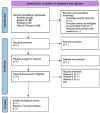Methodological Approach for Dengue Viral Load Quantification in Wastewater: Protocol for a Systematic Review and Meta-Analysis
- PMID: 41232037
- PMCID: PMC12614658
- DOI: 10.2196/71635
Methodological Approach for Dengue Viral Load Quantification in Wastewater: Protocol for a Systematic Review and Meta-Analysis
Abstract
Background: In recent years, the rapid emergence and global spread of dengue has become a public health burden. Clinical surveillance alone has limited capacity, with delayed detection of upcoming outbreaks. Hence, the potential use of wastewater-based surveillance (WBS) for early detection of incoming surges of dengue cases could complement proactive public health action. However, there are still substantial gaps in the standard approach for sampling and detection methods in dengue WBS.
Objective: This review aims to determine the current methodological approach for the detection of dengue virus (DENV) in wastewater across geographical areas.
Methods: The review will be conducted systematically following the PRISMA (Preferred Reporting Items for Systematic Reviews and Meta-Analyses) guidelines. In the initial stage, peer-reviewed publications from PubMed, Embase, Scopus, and Web of Science will be searched using predefined terms such as "Dengue" and "WBS." Keywords will be adjusted to suit each database to identify studies related to DENV WBS from inception until June 2025. Subsequently, the references from relevant articles will be screened for eligibility. All data will be extracted from full-text articles highlighting the characteristics and methodological context of the investigated DENV WBS using a standardized form. The ROBINS-I (Risk of Bias in Non-randomized Studies - of Interventions) tool and the GRADE (Grading of Recommendations Assessment, Development, and Evaluations) system will be used to assess study bias and the quality of the evidence. Further descriptive analysis and meta-analysis will be applied to evaluate the methodologies for DENV WBS.
Results: The data on DENV detection in wastewater will be synthesized by analyzing sampling techniques, viral detection method, study sites, geographic locations and dengue serotype. A meta-analysis will be conducted using a random-effects model if data are heterogeneous, with pooled estimates reported as 95% CIs. Heterogeneity will be assessed using I² and chi-square tests, with subgroup and sensitivity analyses conducted as needed. Findings will be reported in accordance with PRISMA 2020. As of October 2025, records have been identified from the databases and data analysis is expected to be completed by the first quarter of 2026.
Conclusions: This protocol outlines a systematic approach to identifying and evaluating existing methods for detecting DENV in wastewater. This research aims to provide valuable insights into best practices for dengue surveillance and offer guidance for future research by highlighting current strengths and limitations in the field.
Keywords: Dengue virus; sampling methodology; serotypes; viral concentration; wastewater surveillance.
© Nurul Amalina Khairul Hasni, Sakshaleni Rajendiran, Nurul Athirah Nasserudin, Nurul Farehah Shahrir, Terence Yew Chin Tan, Janice Sue Wen Chan, Siti Aishah Rashid. Originally published in JMIR Research Protocols (https://www.researchprotocols.org).
Conflict of interest statement
Figures
References
MeSH terms
Substances
LinkOut - more resources
Full Text Sources
Medical
Research Materials


